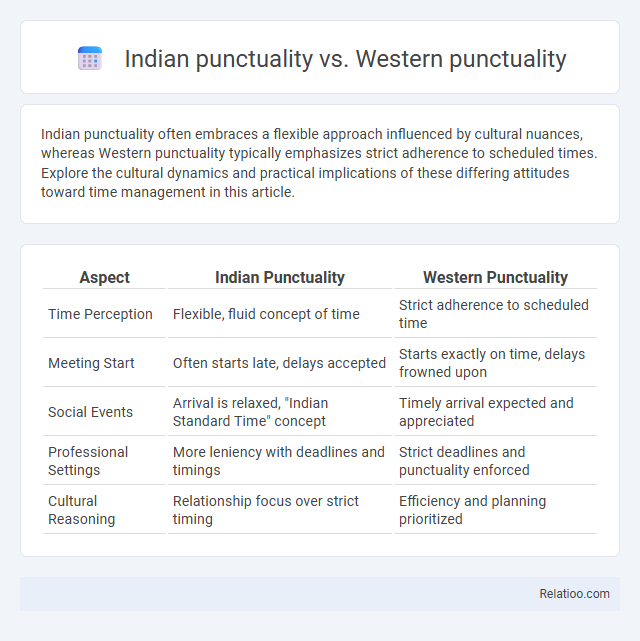Indian punctuality often embraces a flexible approach influenced by cultural nuances, whereas Western punctuality typically emphasizes strict adherence to scheduled times. Explore the cultural dynamics and practical implications of these differing attitudes toward time management in this article.
Table of Comparison
| Aspect | Indian Punctuality | Western Punctuality |
|---|---|---|
| Time Perception | Flexible, fluid concept of time | Strict adherence to scheduled time |
| Meeting Start | Often starts late, delays accepted | Starts exactly on time, delays frowned upon |
| Social Events | Arrival is relaxed, "Indian Standard Time" concept | Timely arrival expected and appreciated |
| Professional Settings | More leniency with deadlines and timings | Strict deadlines and punctuality enforced |
| Cultural Reasoning | Relationship focus over strict timing | Efficiency and planning prioritized |
Introduction to Punctuality in Different Cultures
Punctuality varies significantly across cultures, reflecting diverse social norms and professional expectations. In Western cultures, punctuality is often regarded as a sign of respect, professionalism, and efficiency, with strict adherence to scheduled times. Indian punctuality tends to be more flexible, influenced by cultural values that prioritize relationships and context over rigid timing, leading to a more fluid interpretation of time.
Historical Context of Punctuality in India
Punctuality in India has historically been influenced by cultural perceptions of time, which often emphasize relational priorities over strict adherence to schedules, contrasting with Western punctuality's roots in industrialization and efficiency. Traditional Indian social systems prioritized flexibility and event-based timing, whereas Western societies developed precise timekeeping as a response to mechanized work and commerce demands. This divergence underscores differing attitudes toward time management, where Indian punctuality is evolving amid globalization yet retains historical flexibility in its approach.
The Western Perspective on Time Management
The Western perspective on time management emphasizes strict adherence to schedules, viewing punctuality as a sign of professionalism and respect. Indian punctuality often reflects a more flexible approach, where social interactions and context can influence time adherence, differing from the rigid Western standards. Understanding these cultural nuances is essential for effective communication and collaboration in global business environments.
Social Expectations of Timeliness in India
Social expectations of timeliness in India often reflect a more flexible approach compared to Western standards, where punctuality is closely tied to professionalism and respect for others' time. In Indian culture, delays are frequently tolerated due to relational and contextual factors, emphasizing relationships over strict adherence to schedules. Western punctuality prioritizes exactness and efficiency, influencing global business practices that sometimes clash with Indian social norms.
Workplace Punctuality: East vs West
Workplace punctuality in the West is often rigid, with strict adherence to set start times and deadlines reflecting a culture that values time as a measurable asset. In contrast, Indian workplace punctuality tends to be more flexible, influenced by relational dynamics and a cultural emphasis on personal interaction over timeliness. Your understanding of these differences can enhance cross-cultural collaboration by balancing Western efficiency with Indian adaptability.
Impact of Punctuality on Personal Relationships
Punctuality significantly influences personal relationships by fostering trust and respect, with Western cultures typically emphasizing strict adherence to time as a sign of reliability, while Indian punctuality often allows for a more flexible approach, reflecting relational priorities over exact timekeeping. In Western contexts, consistent timeliness strengthens bonds through dependability and effective communication, whereas in India, the focus on contextual timing can enhance social harmony but may sometimes lead to misunderstandings with those expecting rigid punctuality. Recognizing these cultural differences in punctuality can improve cross-cultural interactions and deepen personal relationships by aligning expectations and showing cultural sensitivity.
Challenges Hindering Punctuality in India
Punctuality in India faces challenges such as cultural perceptions of time flexibility, infrastructural limitations, and traffic congestion that contrast with the strict time adherence seen in Western countries. Indian punctuality is often influenced by a more relaxed approach to schedules, where social interactions and unexpected delays take precedence. Addressing these challenges requires improvements in public transport, awareness about time management, and shifting societal attitudes toward valuing punctuality as a sign of professionalism and respect.
Western Strategies for Promoting Timeliness
Western punctuality emphasizes strict adherence to schedules as a reflection of professionalism and respect, often utilizing tools like digital calendars and time-tracking apps to enhance efficiency. Indian punctuality typically exhibits flexibility due to cultural and contextual factors, where social interactions may take precedence over rigid time adherence. Your best strategy to promote timeliness involves adopting Western methods such as setting clear deadlines, using reminders, and fostering a time-conscious mindset within teams to improve productivity.
Cultural Adaptation and Mutual Respect
Indian punctuality often reflects a flexible approach influenced by cultural norms that prioritize relationships and context over strict time adherence, whereas Western punctuality emphasizes precise timing as a sign of professionalism and respect. Cultural adaptation requires understanding these differences to foster mutual respect, where Western counterparts appreciate relational timing, and Indians acknowledge the importance of schedules in business settings. Embracing diverse punctuality standards enhances cross-cultural interactions and promotes effective communication in global environments.
Bridging the Gap: Fostering Cross-Cultural Understanding
Indian punctuality often reflects a flexible approach influenced by cultural norms, while Western punctuality emphasizes strict adherence to schedules and exact timing. You can foster cross-cultural understanding by recognizing these differences and promoting patience, clear communication, and mutual respect in professional and social interactions. Bridging the gap requires adapting expectations and valuing diverse perspectives on time management to enhance collaboration.

Infographic: Indian punctuality vs Western punctuality
 relatioo.com
relatioo.com